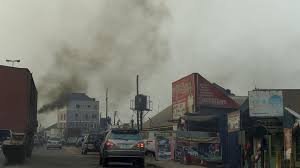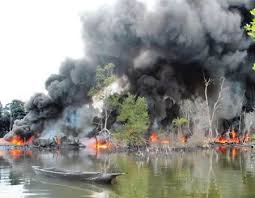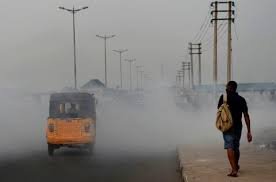The Damage caused by soot in River state, nigeria
By Moses Eze
In Rivers State Nigeria, efforts to navigate the COVID-19 pandemic could be rendered futile due to a long-running air pollution crisis—black soot. Years after the 2016 and 2018 #StopTheSoot protests, hits Port Harcourt and other parts of Rivers State in south-eastern Nigeria of which I took part in it, these above areas mentioned are still covered in black soot. Recently, residents’ health concerns have re-emerged due to the emergence of the new COVID-19 variant, Omicron.
Black soot is a black particulate matter made up of carbon and results from the incomplete combustion of fossil fuels. Residents of Rivers State and experts across Nigeria believe that illegal crude oil operations and the destruction of products from illegal oil refineries are responsible for the black soot. With my investigatiion I spoke with one Saatah Nubari, a state resident, says, ‘one of the causes [of the black soot] is destroying products that are gotten from illegal crude refining.When you burn them, it goes up into the atmosphere’.
In 2019 report based on analysis of Rivers State hospitals from 2014-2021 found that in over 20,000 people who received care for soot-related conditions, black soot had caused adverse respiratory, skin and reproductive disorders are including women and children.
There was an indication that, as of 2020-2021, the death rate from black soot-related health issues in Rivers State had risen to 25,000 (including babies). I'm have particularly calling on the Federal Government and State Government to doing everything possible towards saving the people of River State. [This black soot] is a reflection of the state of affairs and how the government has failed to protect her citizens who are in an urgent needs of good and liveable environment.
We all know that according to the World Health Organization, outdoor air pollution causes 4.2 million deaths each year across the world. Additionally, 99 per cent of the global population is exposed to a high level of air pollution which puts them at risk for heart disease, stroke, cancer, and other life-threatening medical conditions. Black soot, in particular, can be linked to a wide range of severe health effects, including acute bronchitis (an inflammation that causes coughing) and an aggravated breathing situation for asthma patients.
As the world continues to grapple with COVID-19, studies have indicated that air pollution could exacerbate the pandemic’s impacts on people. We all know Omicron has already been detected in Nigeria, I expects a major breakout in Rivers State because the immune systems of many residents are highly debased presently, Nigeria has recorded over 200,000 COVID-19 cases, with over 13,000 cases (the third largest after Lagos and Abuja) recorded in Rivers State alone.
I have some initiatives which I believe can mitigate the black soot crisis, in River State which includes: an environmental audit of Rivers State; a comprehensive audit of the respiratory organs of all residents of Rivers State; and the establishment of more accessible health care facilities in Rivers State.
I'm using this medium to call on the international communities especially the United Nations to come to the rescue of the people of River State Nigeria by holding governments at all levels to an account in finding lasting solutions to this environmental crisis.
So far, an estimated 5,000 women and children has been infected so far between 2021-2022 and the numbers keep increasing without the necessary actions taken to protecting the most vulnerable people in the state.



